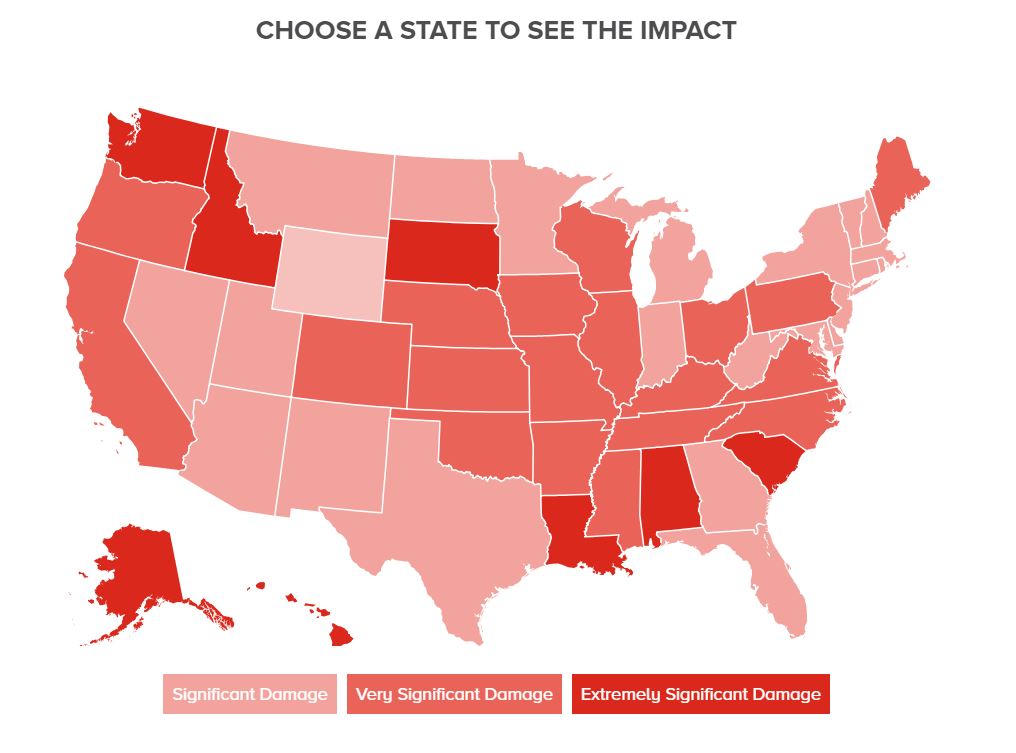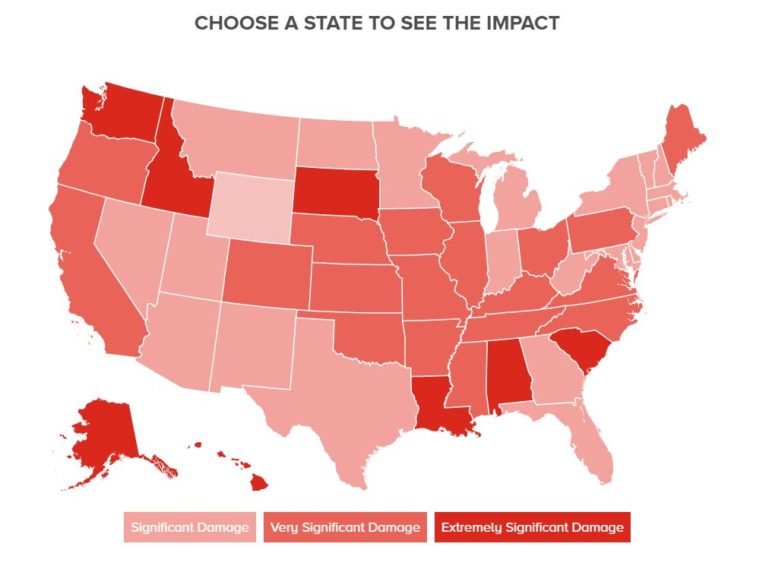Kelsey Hamlin
The Public Religion Research Institute found one-third (31 percent) of Americans feel diversity (or the fact that people of color are on pace to become the majority demographic) will have a negative impact. But journalist David Robert, who is quickly becoming a favorite of mine, started thinking:
It occurred to me that white people rarely if ever experience questions like this, about their very legitimacy. Do they belong? Is having more of them around good for America?
So he did what any reasonable journalist would do, and asked Twitter. He made a poll. If nothing else, he did it because he had a sense of what would happen next (which is exactly what did happen). Right-wing Twitter got a hold of it, and you can only imagine the result. Check his thought process throughout and after it all on Vox.
The US Chamber of Commerce released an interactive map this week, showing how the new tariffs impact each state. It even breaks down which products are hit hardest and which country is targeted. Washington is in the “extremely significant damage” category, while Oregon and California face “very significant damage.” The Chamber of Commerce’s post that accompanied the map was particularly critical of the executive branch:
Retaliatory tariffs imposed by other countries on U.S. exports will make American-made goods more expensive, resulting in lost sales and ultimately lost jobs here at home.
Meanwhile, Washington’s own Congresswoman Pramilla Jayapal got called out for talking the talk but not walking the walk. Her sixteen unpaid interns threatened to strike unless, well, they got paid. But this story ends happily. Now, twelve of them will get paid an average of $18 an hour, with ORCA cards (ayyy, transit).
One of Seattle’s newest council members will introduce new legislation, taking a whack at the affordable housing crisis. The plan? Allow Seattle City Light, one of the largest landholders in the city, to sell its surplus property to affordable-housing developers at less than market value. That even goes all the way down to the original price the company paid years prior. If an agency committed to building housing at 60 percent or less the Area Median Income, the proposal mandates Seattle City Light to sell to devoloper(s) at the OG price it was bought.
Eric de Place
I recommend the book So You Want to Talk about Race by Seattle’s Ijeoma Oluo, which I just finished reading. It’s crisp, funny, stern, clear, and practical. An exceptionally useful guide for navigating the difficult conversations so many of us are wrestling with these days.
And it’s nice to transition from a lived experience to a visual one. While the true-story movie Adrift didn’t exactly make me want to spend more time sailing, I enjoyed it!
This past week, I was also fascinated by Max Fisher’s take on politics in Israel, where he locates an increasingly strained tension between democracy and identity. As in other parts of the world, it appears Israelis increasingly see the two in conflict—and they choose identity.
In other news, Facebook agreed to end its blatantly discriminatory ad practices after Washington’s Attorney General sued the company.
But Facebook has been in the news recently for other troubling reasons.
John Abbotts
The Seattle Times ran its annual survey on CEO compensation, and I found some of the comparisons positively feudal: One CEO total compensation to median worker pay came in at 431-to-1 ratio. Other CEOs received over $1 million per year while the median worker pay was $7,396 and $6,997. The survey was accompanied by a piece from economics columnist Jon Talton, who concluded that extreme wealth of CEOs is “one symptom of a society pulling apart. It can’t end well.”
Other readers may have followed this year’s World Cup, or what the rest of the globe calls “football.” At the start, I hoped the winner would be a nation that had not won a Cup before. It almost happened: the early favorites Brazil, Germany, and Argentina were all gone before the semi-finals. Second and third places went to new challengers Croatia and Belgium, respectively. But (spoiler alert) France won—although “only” its second World Cup. In addition, French striker Kylian Mbappe became the first teenager to score in a World Cup final since Edson Arantes do Nascimento (better known as Pelé) in 1958—lofty company, that. He also gave a double “high-five” to one of the Pussy Riot protesters during the final match, a photo that went viral for a World Cup that was held in Russia.
As someone who grew up with dogs, I was interested in this New York Times article, describing how dog-walking benefits both the dog and the human walker.









